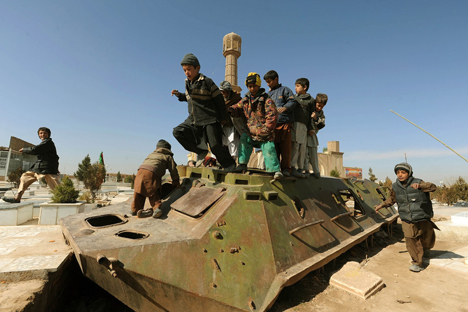
Afghan children play on the remains of a Soviet-era armoured personnel carrier in Herat on February 15, 2012. Source: AFP / East News
Russian defense officials are to discuss with NATO representatives the possibility of setting up arms and military equipment repair bases in Afghanistan, the Defense Ministry says. Russians in military uniforms might thus, for the first time since 1989, return to the country, where experts are predicting a restoration of the Kremlin’s influence.
Sergei Koshelev, head of the Main Division for International Military Cooperation of Russia’s Defense Ministry, announced on March 27 that Russian defense officials and NATO representatives are to discuss establishing arms and armored-equipment repair bases in Afghanistan at the Military and Political Aspects of European Security international conference, which is to be held in Moscow on May 23-24.
“We will look into options for establishing repair bases in the territory of Afghanistan,” Koshelev said, adding that keeping the Afghani military’s arms and military equipment in working order remains an important task. He also noted that any deterioration of the situation in Afghanistan after the NATO pullout scheduled for 2014 could have a negative effect on security for both Russia and several other European countries.
Afghanistan may be threat to Russia's security after 2014 - analyst
NATO owes the UN an explanation
Russian diplomats are also counting on expanding cooperation with NATO in Afghanistan after 2014, when the International Security Assistance Force withdraws from that country, Russia’s permanent representative to the alliance, Alexander Grushko, said.
“We are not ruling out new areas of cooperation [with NATO] in Afghanistan. This will largely depend on the nature of the NATO mission’s international presence in Afghanistan beyond 2014, as well as on the tasks still to be accomplished in Afghanistan,” RIA Novosti quoted Grushko as saying.
In particular, Moscow is ready to expand the corridor for transportation of the international force’s freight from Afghanistan.
President Hamid Karzai previously promised that Afghanistan would become safer once the NATO pullout is complete. It is not ruled out that Karzai might soon engage in direct peace talks with the Taliban for the first time. The negotiations could take place in Qatar, where the Taliban’s first official mission recently opened.
In turn, former U.S. Secretary of Defense Leon Panetta stated earlier that Afghanistan’s authorities were already providing security to 75 percent of the country’s population.
The former Pentagon chief said that the coalition in Afghanistan was “on track to meet the goals our nations agreed last year [at the NATO summit] in Chicago.” Even though Afghan forces are set to take over lead security responsibility, Panetta pledged continued U.S. commitment to develop and sustain Afghan forces past 2014.
Meanwhile, Russian media have reported that a group of U.S. Congressmen once again demanded that the Pentagon abandon plans to purchase helicopters for Afghanistan from Rosoboronexport. This is not the first such call and the U.S. administration has rejected them before.
According to Col. Anatoly Tsyganuk, an expert at the Military Forecasting Center and a member of the Civic Council attached to the Ministry of Defense, Russia’s current intervention in Afghanistan’s affairs is a forced step.
“The Americans are pulling out and leaving 30 percent of their equipment behind. The equipment needs to be maintained. Plus, there’s a lot of Russian — or, more precisely, Soviet — equipment on the ground there, which also requires repairs,” he told Vzglyad.
At the same time, the military expert community is anxious about U.S. actions, as they openly intend to leave some of their equipment in Central Asian countries. “They say they’re withdrawing, but they are leaving their equipment, which is different from ours — meaning that American specialists will be present in this region of the CIS,” said Tsyganuk.
Vadim Kozyulin, a professor at the Military Sciences Academy and director of the Conventional Arms and ATT Project at the PIR Center, believes that Russia will not return to Afghanistan, as President Vladimir Putin has stated repeatedly.
“We might provide them with technical assistance or train their specialists,” Kozyulin told Vzglyad. He observed that American bases are located where Soviet troops were stationed in the 1980s. Russian specialists will not, therefore, have to start from scratch. The U.S. has a huge logistics operation in Afghanistan and they could use some help.
The expert also recalled that a lot of Russian equipment still remains in Afghanistan from the Soviet era. It has proved its worth and Afghan pilots are familiar with it: “Russian helicopters bought for Afghanistan today are easy to operate and are known to local pilots.” Kozyulin believes that Afghanistan would not host large repair bases, since the equipment would be taken to plants in Russia for an overhaul.
Kozyulin did not rule out that Moscow’s influence in this area could gain strength again. Yet this has more to do with geopolitical factors, rather than the return of Russian specialists to Afghanistan.
“The influence is inevitable. As the Americans withdraw, the EU and the U.S. will lose interest in the region. As soon as the troops pull out, all responsibility will quietly shift to adjacent countries, which are our CSTO allies or closest neighbors, like Uzbekistan,” said Kozyulin. “That’s why, as a major regional power, Russia will, without doubt, have a direct connection to everything that’s going on in the country and will shoulder some of the responsibility. In other words, the American game is coming to an end. It’s time we started our own, which means assuming the responsibility.”
First published in Russian in Vzglyad
All rights reserved by Rossiyskaya Gazeta.
Subscribe
to our newsletter!
Get the week's best stories straight to your inbox